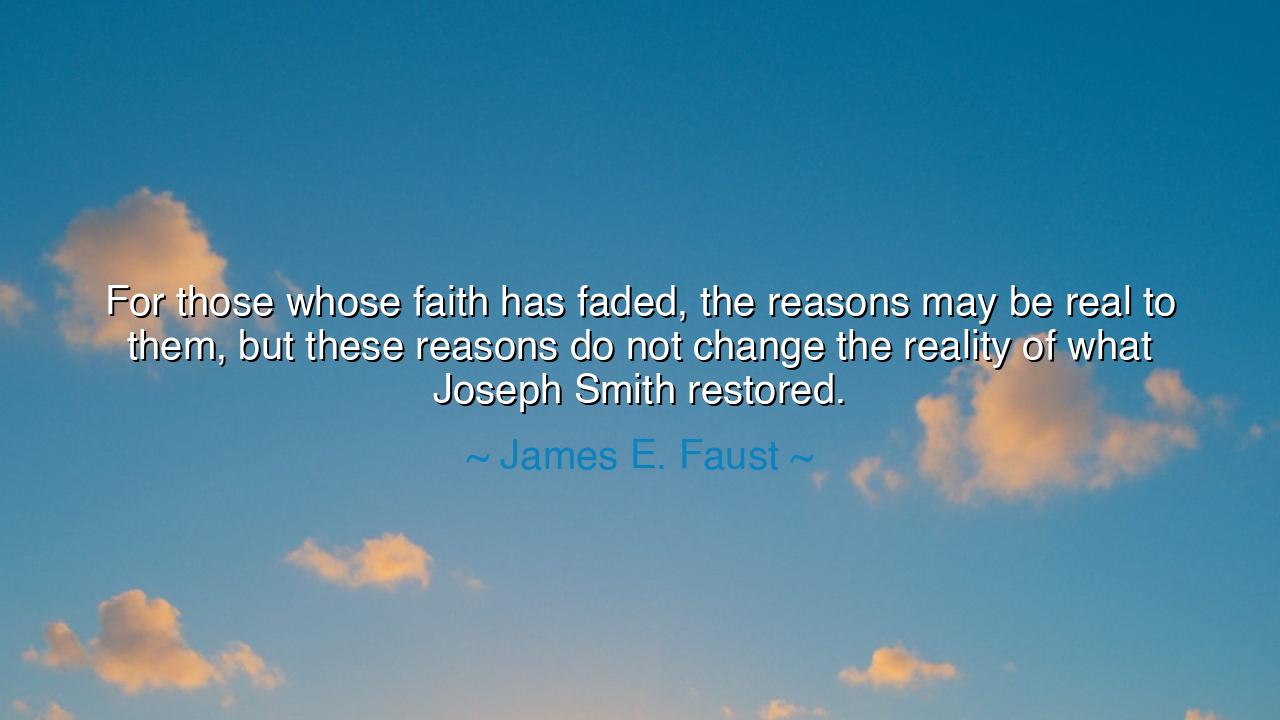
For those whose faith has faded, the reasons may be real to them
For those whose faith has faded, the reasons may be real to them, but these reasons do not change the reality of what Joseph Smith restored.






Host: The soft light from the window filtered through the curtains, casting long shadows on the floor. The room felt quiet, almost serene, as Jack sat with his hands folded, gazing out into the stillness of the evening. Jeeny sat nearby, her attention momentarily drawn to him. There was a thoughtfulness in his posture, something on his mind that she could sense.
Jeeny: “You seem lost in thought. What’s on your mind, Jack?”
Jack: “I came across a quote today from James E. Faust. He said, ‘For those whose faith has faded, the reasons may be real to them, but these reasons do not change the reality of what Joseph Smith restored.’ It’s one of those quotes that made me pause. It feels like a reminder that faith, even when it’s shaken, doesn’t change what was originally restored or the truth of it. But it’s such a powerful concept.”
Jeeny: “It’s an interesting perspective, isn’t it? The idea that faith is a choice, and when it fades, the reasons we give for it might feel real to us at the time, but they don’t necessarily alter the reality of what was restored. It speaks to the power of the original message, the foundation laid by Joseph Smith, and how that truth remains unchanged, regardless of personal doubt or circumstance.”
Jack: “I think that’s what struck me. Faith can be fragile, and when it fades or falters, it’s easy to find reasons for it. But Joseph Smith’s work—the principles he restored—remains intact, no matter how we feel at any given moment. The reality of it, the truth behind it, is still there.”
Jeeny: “It’s like the difference between feeling something and knowing it to be true. Our feelings, our doubts, can sometimes cloud our understanding, but that doesn’t change the reality of what’s been restored. The truth remains, whether we see it clearly or not. The challenge is remembering that, especially when faith seems distant.”
Jack: “Yeah, it’s easy to get caught up in the doubts, in the questions that seem to loom larger than the answers. But at the core, the foundation of Joseph Smith’s work doesn’t change. What he restored still stands, regardless of how I might feel at any given time.”
Jeeny: “That’s the power of truth—it’s unshaken by our doubts, our fears, or even our confusion. The challenge is in trusting that reality, even when we can’t always see it clearly. But when we step back, when we remember the foundational truths, we can find our way back to faith.”
Jack: “So, even if my faith falters or I have questions, that doesn’t change the truth of what was restored. It’s still there, still true. It’s just a matter of reconnecting with it, of choosing to trust in that reality, even when it feels distant.”
Jeeny: “Exactly. Faith isn’t a constant state—it ebbs and flows. But the truth doesn’t change. The journey is about finding our way back, time and time again, to that foundation, even when it feels hard.”
Host: The room was quiet now, filled with a deep understanding. Jack sat still, contemplating the idea that truth, once restored, remains constant, unaffected by personal doubt or shifting feelings. The ebb and flow of faith may challenge us, but the reality of what has been restored remains as a guiding light, always there to be rediscovered.






AAdministratorAdministrator
Welcome, honored guests. Please leave a comment, we will respond soon